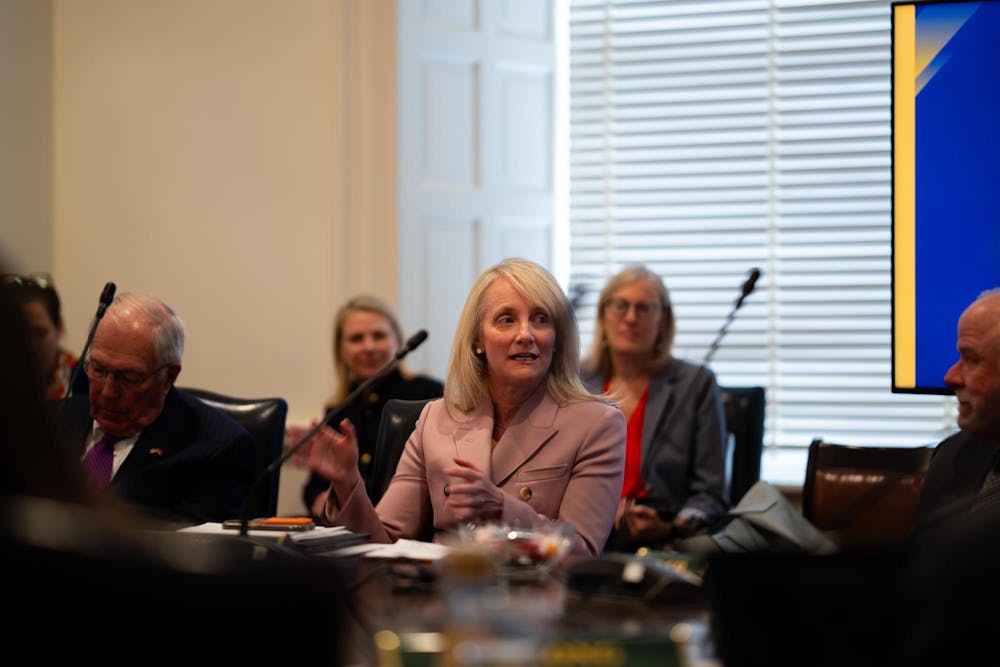The Senate of Virginia again demanded answers from the Board of Visitors about the resignation of former University President Jim Ryan in a letter sent Monday by State Sen. Creigh Deeds, D-Charlottesville. This comes after multiple other letters were exchanged between Deeds and the University beginning Aug. 1.
The Cavalier Daily obtained this letter, sent to Board Rector Rachel Sheridan, from a source who wished to remain anonymous and confirmed its authenticity through a representative from Deeds’ district office.
Ryan resigned in late June after the Justice Department sent seven letters to the University and launched investigations into diversity, equity and inclusion policies, admissions practices and antisemitism. The New York Times also reported that the Justice Department had asked the University to remove Ryan.
In his most recent letter, Deeds said that because he had not received sufficient answers to previous questions, he spoke to outside sources for knowledge of the events leading up to Ryan’s resignation. He called his findings from these sources “deeply troubling.”
“These individuals showed respect for the General Assembly's oversight role and treated my inquiries with the seriousness they warrant,” Deeds wrote.
Deeds said in an interview Wednesday that these individuals were former members of the Board.
In a previous response to Deeds sent on behalf of the Board, law firm Debevoise & Plimpton noted that the University could not answer Deeds’ questions regarding negotiations with the federal government because of confidentiality issues.
Deeds said he is seeking clarification on whether the Justice Department — particularly Assistant Attorney General Harmeet Dhillon — specifically called for Ryan’s resignation, something Dhillon has publicly denied. Deeds alleged that neither Sheridan nor the University’s outside legal counsel, McGuireWoods, had notified the full Board of a request for Ryan’s resignation.
“If the DOJ did call for President Ryan's resignation, a failure to convey that information to the full Board is deeply concerning,” Deeds wrote. “If, on the other hand, the DOJ did not call for his resignation, a decision to propose to DOJ officials that President Ryan would resign is equally troubling.”
A University spokesperson offered comment on Deeds’ allegations, saying the University has responded to Deeds and will provide information “when it is possible.” The statement also said that the University is committed to transparency, but must protect its long-term interests.
“Circulating inaccurate and incomplete narratives before the facts can be responsibly disclosed does not help the University navigate the challenges that it faces,” the statement read.
In Wednesday’s interview, Deeds said the University has informed him that his narratives are inaccurate, but has not told him how or offered to provide more accurate information.
Deeds also alleged in Monday’s letter that McGuireWoods and Sheridan had offered for Ryan to resign at the end of the 2025-26 academic year as a resolution for Justice Department investigations.
However, Deeds went on to write that he had been informed that the Justice Department had demanded Ryan’s immediate resignation in exchange for “blanket immunity” for the University, meaning the Justice Department would close its investigations into the University and agree not to launch new ones. Under these conditions, Deeds alleged that the Justice Department also promised that federal funding to the University would be protected from future cuts and that the Board would be allowed to govern the University without interference from the federal government in future.
As of Monday, only two of the seven Justice Department investigations have been publicly announced as closed, as shared by Interim President Paul Mahoney at the Board meeting Sept. 12.
In the letter, Deeds requested more information from Sheridan on the terms of the agreement with the Justice Department, and why the University did not obtain the terms of the deal in writing.
“What, if anything, did you get in exchange for President Ryan's resignation?” Deeds wrote.
This letter is the latest in a series of letters Deeds has sent. Deeds sent an initial letter to Rector Rachel Sheridan Aug. 1, with a list of 46 questions that he and the Senate wanted answered, including whether members of the Board acted independently when negotiating with the Justice Department.
The Board responded to Deeds by his Aug. 15 deadline but said it could not provide specifics on Justice Department inquiries because of ongoing negotiations with the federal government. It sent an additional letter Aug. 29 with more information about some of Deeds’ questions, but Deeds told The Cavalier Daily that the response was “not adequate” and called it “crap.”
He said in Wednesday’s interview that he has dealt with several rectors appointed by both Republicans and Democrats in the past.
“I’ve represented Charlottesville for almost 24 years…I’ve never had [a rector] who felt like they had to deal with me through a lawyer or a law firm,” Deeds said.
After the Aug. 29 letter, Deeds also said that the Board failed to answer 38 of his 46 questions. In Monday’s letter, he noted again that most of those questions had gone unanswered.
Monday’s letter followed Deeds’s decision to submit a Freedom of Information Act Request Sept. 18 for comprehensive records pertaining to Ryan’s resignation, Board communications with state and federal government officials and financial records regarding federal funding.
As for next steps, Deeds told The Cavalier Daily Wednesday that Senate or House committees could hold hearings and call Board members to testify. He also noted that the General Assembly has the power over the state funds which the University receives. While he said he would not personally advocate for cutting funds to the University, he said it may be something the General Assembly looks at if it does not receive more information.







